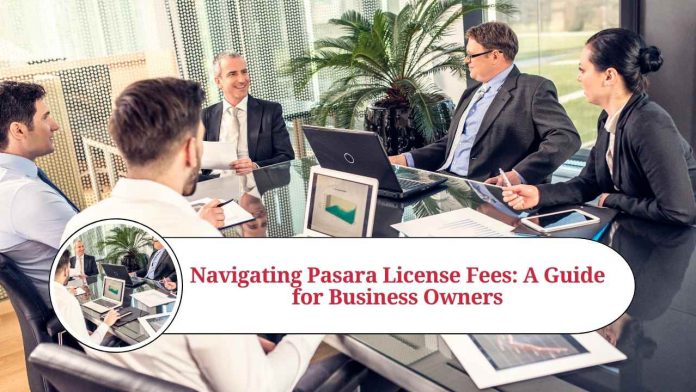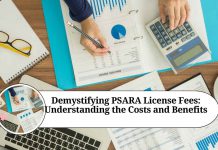If you’re an entrepreneur or business owner considering venturing into the world of retail or wholesale trade, you may have come across the term “Pasara license” or “market license.” Pasara, derived from the Spanish word “paz” meaning peace, refers to traditional markets commonly found in many countries around the world. These bustling marketplaces offer a vibrant mix of vendors, stalls, and shoppers, creating a unique shopping experience.
However, before you can set up shop in a Pasara market, you’ll need to understand the concept of Pasara license fees. In this blog post, we will explore the significance of Pasara licenses and discuss the factors influencing their fees.
Understanding Pasara Licenses:
A Pasara license is a legal permit granted by local authorities that allows individuals or businesses to operate within designated market areas. These licenses serve to regulate market activities, ensure vendor compliance with health and safety standards, maintain order, and facilitate fair trade practices.
The Pasara license fee is a financial requirement imposed by the governing bodies responsible for managing the market. The fee structure may vary depending on the location, size, and popularity of the market. It is important to note that Pasara license fees are generally recurring, requiring periodic renewal to maintain business operations within the market.
Factors Influencing Pasara License Fees:
- Market Location: The location of the Pasara market plays a significant role in determining license fees. Markets situated in prime areas with high foot traffic or popular tourist destinations often command higher fees due to the potential for increased sales and exposure. On the other hand, markets in less central or remote locations may have lower license fees.
- Market Size and Facilities: The size and facilities available within the market premises also influence license fees. Larger markets with extensive infrastructure, such as well-maintained stalls, parking areas, sanitation facilities, and security systems, typically have higher fees due to the costs associated with maintaining and managing these amenities.
- Market Demand and Competition: The level of demand and competition within the market can impact license fees. If the market is in high demand and has limited stall spaces available, the authorities may increase the fees to ensure fair access and maximize revenue. Conversely, markets with lower demand may have more affordable license fees to attract vendors and encourage economic activity.
- Local Regulations and Policies: Each jurisdiction may have its own set of regulations and policies governing Pasara licenses. These regulations can significantly influence the fees charged. Some localities may set fixed fees, while others may use a tiered system based on business size or revenue. It is crucial for business owners to familiarize themselves with the specific regulations in their area to accurately assess the costs involved.
Benefits of Obtaining a Pasara License:
While Pasara license fees may seem like an additional expense for business owners, obtaining a license offers several benefits:
- Legitimacy and Credibility: Having a Pasara license demonstrates that your business operates within the legal framework set by the local authorities. It enhances your credibility among customers and fellow vendors, fostering trust and attracting more patrons to your stall.
- Access to a Targeted Market: Pasara markets are often frequented by a diverse range of customers seeking unique products and local experiences. By securing a license, you gain access to this captive audience, allowing you to showcase your products and boost sales.
- Networking and Collaboration Opportunities: Participating in a Pasara market exposes you to a community of like-minded vendors and entrepreneurs. This environment presents opportunities for collaboration, networking, and knowledge sharing, which can contribute to the growth and success of your business.
Read more useful content:
Frequently Asked Questions (FAQs)
Q. What is a Pasara license fee?
A Pasara license fee is a financial requirement imposed by the local authorities for individuals or businesses to operate within a designated Pasara market area. It is a recurring fee that needs to be renewed periodically.
Q. Why do I need a Pasara license?
A Pasara license is necessary to legally operate within a Pasara market. It ensures compliance with health and safety standards, maintains order, and facilitates fair trade practices. Without a license, you may face penalties or be prohibited from conducting business within the market.
Q. How are Pasara license fees determined?
Pasara license fees are determined based on various factors. These include the market’s location, size, popularity, available facilities, and local regulations. Fees may vary from one market to another.
Q. Can the Pasara license fee change over time?
Yes, the Pasara license fee can change over time. Local authorities may revise the fee structure based on market conditions, infrastructure improvements, or changes in regulations. It’s important to stay updated on any fee changes and plan your budget accordingly.
Q. Is the Pasara license fee a one-time payment?
No, the Pasara license fee is not a one-time payment. It is a recurring fee that needs to be paid periodically, usually on an annual basis. License holders are required to renew their licenses within a specified timeframe to continue operating in the market.
Q. Can I negotiate or appeal the Pasara license fee?
In some cases, negotiation or appeal of the Pasara license fee may be possible. However, this depends on the regulations and policies of the local authorities. It is advisable to consult with the market management or relevant government agencies to understand the process and requirements for negotiation or appeal.
Q. What are the benefits of paying the Pasara license fee?
Paying the Pasara license fee offers several benefits. It grants legitimacy and credibility to your business, allows access to a targeted market of potential customers, provides networking and collaboration opportunities with other vendors, and ensures compliance with local regulations.
Q. Can I operate in a Pasara market without a license?
Operating in a Pasara market without a license is generally illegal and may lead to penalties, fines, or eviction from the market. It is important to obtain the necessary license to avoid legal complications and to operate within the framework of the law.
Q. How can I obtain a Pasara license?
The process of obtaining a Pasara license varies depending on the location and the local authorities’ requirements. Generally, you need to contact the market management or relevant government agency responsible for issuing the licenses. They will provide you with the necessary information and guide you through the application process.
Q. What happens if I fail to renew my Pasara license?
If you fail to renew your Pasara license within the specified timeframe, your business may be considered unauthorized, and you may be asked to cease operations immediately. It is crucial to adhere to the renewal process to avoid disruptions in your business activities.




















